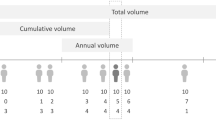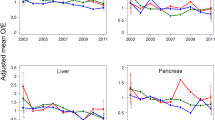Abstract
Background
The purpose of this study was to determine whether morbidity and mortality in patients undergoing elective resection of colon cancer are associated with surgeon or hospital volume.
Methods
Using the Nationwide Inpatient Sample database, we identified all adult patients who underwent elective resection for colon cancer as their primary procedure between 2003 and 2007. Cases were divided into three groups according to the mean number of resections performed annually by each surgeon: low volume (≤4/year), intermediate volume (5–9/year), or high volume (≥10/year). Annual hospital case-load was also categorized as low volume (≤30/year), intermediate volume (31–60/year), and high volume (≥61/year). Multiple logistic regression models were used to identify differences in morbidity and mortality.
Results
A total of 54,000 patients underwent resection of colon cancer by 7,313 surgeons in 1,398 hospitals. After adjusting for important covariates including hospital volume, colon cancer resection by high-volume surgeons was an independent predictor of decreased morbidity (odds ratio [OR], 0.91; 95% CI, 0.85–0.97) and mortality (OR, 0.75; 95% CI, 0.65–0.86). Mortality was lowest among patients operated on by high-volume surgeons in high-volume hospitals (2.2% vs. 3.9%; OR, 0.56; 95% CI, 0.46–0.68).
Conclusions
In patients undergoing elective resection of colon cancer, procedures done by high-volume surgeons are associated with decreased morbidity and mortality.

Similar content being viewed by others
References
Estimated new cancer cases and death by sex, US [National Cancer Institute] 2009. Available at: http://www.cancer.org/downloads/stt/CFF2009_EstCD_3.pdf. Accessed January 23, 2010
Longo WE, Virgo KS, Johnson FE, Oprian CA, Vernava AM, Wade TP, et al. Risk factors for morbidity and mortality after colectomy for colon cancer. Dis Colon Rectum. 2000 Jan;43(1):83–91.
Birkmeyer JD, Stukel TA, Siewers AE, Goodney PP, Wennberg DE, Lucas FL. Surgeon volume and operative mortality in the United States. N Engl J Med. 2003 Nov 27;349(22):2117–2127.
Birkmeyer JD, Siewers AE, Finlayson EV, Stukel TA, Lucas FL, Batista I, et al. Hospital volume and surgical mortality in the United States. N Engl J Med. 2002 Apr 11;346(15):1128–1137.
Billingsley KG, Morris AM, Green P, Dominitz JA, Matthews B, Dobie SA, et al. Does surgeon case volume influence nonfatal adverse outcomes after rectal cancer resection? J Am Coll Surg. 2008 Jun;206(3):1167–1177.
Kressner M, Bohe M, Cedermark B, Dahlberg M, Damber L, Lindmark G, et al. The impact of hospital volume on surgical outcome in patients with rectal cancer. Dis Colon Rectum. 2009 Sep;52(9):1542–1549.
Harling H, Bulow S, Moller LN, Jorgensen T, Danish Colorectal Cancer Group. Hospital volume and outcome of rectal cancer surgery in Denmark 1994–99. Colorectal Dis. 2005 Jan;7(1):90–95.
Schrag D, Panageas KS, Riedel E, Cramer LD, Guillem JG, Bach PB, et al. Hospital and surgeon procedure volume as predictors of outcome following rectal cancer resection. Ann Surg. 2002 Nov;236(5):583–592.
Rogers SO Jr, Wolf RE, Zaslavsky AM, Wright WE, Ayanian JZ. Relation of surgeon and hospital volume to processes and outcomes of colorectal cancer surgery. Ann Surg. 2006 Dec;244(6):1003–1011.
Harmon JW, Tang DG, Gordon TA, Bowman HM, Choti MA, Kaufman HS, et al. Hospital volume can serve as a surrogate for surgeon volume for achieving excellent outcomes in colorectal resection. Ann Surg. 1999 Sep;230(3):404–11; discussion 411–3.
Karanicolas PJ, Dubois L, Colquhoun PH, Swallow CJ, Walter SD, Guyatt GH. The more the better? The impact of surgeon and hospital volume on in-hospital mortality following colorectal resection. Ann Surg. 2009 Jun;249(6):954–959.
Schrag D, Cramer LD, Bach PB, Cohen AM, Warren JL, Begg CB. Influence of hospital procedure volume on outcomes following surgery for colon cancer. JAMA. 2000 Dec 20;284(23):3028–3035.
Ingraham AM, Cohen ME, Bilimoria KY, Feinglass JM, Richards KE, Hall BL, et al. Comparison of hospital performance in nonemergency versus emergency colorectal operations at 142 hospitals. J Am Coll Surg. 2010 Feb;210(2):155–165.
Nationwide Inpatient Sample, 2007 [Healthcare Cost and Utilization Project (HCUP) web site]. Available at: www.hcup-us.ahrq.gov/databases.jsp. Accessed November 15, 2009
Whalen D, Houchens R, Elixhauser A. 2004 HCUP nationwide inpatient sample (NIS) comparison report. HCUP method series report [Healthcare Cost and Utilization Project (HCUP) web site]. Available at: http://www.hcup-us.ahrq.gov/reports/methods.jsp. Accessed March 15, 2007.
Practice Management Information Corporation, International classification of diseases, 9th revision, clinical modification (ICD-9-CM). 6th ed, Practice Mgmt Information Corp; 2002.
Elixhauser A, Steiner C, Harris DR, Coffey RM. Comorbidity measures for use with administrative data. Med Care. 1998 Jan;36(1):8–27.
US Department of Labor: Bureau of Labor Statistics. Consumer price index—all urban consumers (US Medical Care 1982–1984=100). Available at: http://www.bls.gov/cpi/home.htm.
Shaheen AA, Kaplan GG, Hubbard JN, Myers RP. Morbidity and mortality following coronary artery bypass graft surgery in patients with cirrhosis: a population-based study. Liver Int. 2009 Sep;29(8):1141–1151.
Houchens R EA. Final report on calculating Nationwide Inpatient Sample (NIS) variances, 2001. HCUP Methods Series Report #2003-2, US Agency for Healthcare Research and Quality. 2006. Available at: http://www.hcup-us.ahrq.gov/reports/2003_2.jsp. Accessed 10/28, 2009.
Schrag D, Panageas KS, Riedel E, Hsieh L, Bach PB, Guillem JG, et al. Surgeon volume compared to hospital volume as a predictor of outcome following primary colon cancer resection. J Surg Oncol. 2003 Jun;83(2):68–78.
Ko CY, Chang JT, Chaudhry S, Kominski G. Are high-volume surgeons and hospitals the most important predictors of in-hospital outcome for colon cancer resection? Surgery. 2002 Aug;132(2):268–273.
Larson DW, Marcello PW, Larach SW, Wexner SD, Park A, Marks J, et al. Surgeon volume does not predict outcomes in the setting of technical credentialing: results from a randomized trial in colon cancer. Ann Surg. 2008 Nov;248(5):746–750.
Rabeneck L, Davila JA, Thompson M, El-Serag HB. Surgical volume and long-term survival following surgery for colorectal cancer in the Veterans Affairs Health-Care System. Am J Gastroenterol. 2004 Apr;99(4):668–675.
Dimick JB, Cowan JA Jr, Upchurch GR Jr, Colletti LM. Hospital volume and surgical outcomes for elderly patients with colorectal cancer in the United States. J Surg Res. 2003 Sep;114(1):50–56.
Billingsley KG, Morris AM, Dominitz JA, Matthews B, Dobie S, Barlow W, et al. Surgeon and hospital characteristics as predictors of major adverse outcomes following colon cancer surgery: understanding the volume-outcome relationship. Arch Surg. 2007 Jan;142(1):23–31; discussion 32.
Kane RL, Shamliyan TA, Mueller C, Duval S, Wilt TJ. The association of registered nurse staffing levels and patient outcomes: systematic review and meta-analysis. Med Care. 2007 Dec;45(12):1195–1204.
Hillner BE, Smith TJ, Desch CE. Hospital and physician volume or specialization and outcomes in cancer treatment: importance in quality of cancer care. J Clin Oncol. 2000 Jun;18(11):2327–2340.
Chassin MR, Park RE, Lohr KN, Keesey J, Brook RH. Differences among hospitals in Medicare patient mortality, Health Serv Res. 1989 Apr;24(1):1–31.
Conflicts of interest
No conflicts of interest exist.
Grant support
Dr. Myers is supported by a Clinical Investigator Award from the Alberta Heritage Foundation for Medical Research and a New Investigator Award from the Canadian Institutes of Health Research.
Author information
Authors and Affiliations
Corresponding authors
Additional information
Description of the study
Retrospective database analyses of the impact of surgeon and hospital volume on outcomes in elective colon cancer resection.
Poster presentation
Digestive Disease Week, 1–5 May 2010, New Orleans, LA, USA.
Rights and permissions
About this article
Cite this article
Drolet, S., MacLean, A.R., Myers, R.P. et al. Elective Resection of Colon Cancer by High-Volume Surgeons Is Associated with Decreased Morbidity and Mortality. J Gastrointest Surg 15, 541–550 (2011). https://doi.org/10.1007/s11605-011-1433-x
Received:
Accepted:
Published:
Issue Date:
DOI: https://doi.org/10.1007/s11605-011-1433-x




